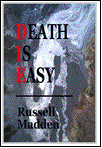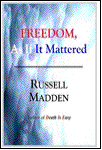 |
 |
|
|
 |
 |
|
|
Most novels that present a positive image of liberty fall into one of two broad categories. The first type of freedom-friendly fiction is set in a society where there is very little freedom actually left. A few hunted individuals who resist a tyrannical society are in danger of being crushed in a final blow. Through dedication and determination they succeed in a) overthrowing the police state threatening to engulf them, or b) they manage to win small victories that provide them the encouragement they need to continue the long struggle ahead. (Think Atlas Shrugged.)
The second kind of fiction that portrays liberty in a positive state is one in which a free society exists but is in imminent danger of being overthrown by statists and collectivists intent on regaining power over their fellow citizens. Almost always, these stories occur in a science-fictional universe, largely divorced from how people live in the here-and-now. As such, they frequently read more as fantasies than as cultures recognizable to current readers. (Think L. Neal Smith.)
Both of these venues for freedom-oriented books place the theme of liberty first-and-foremost, either in the fight to win freedom or in the battle to retain it.
As fun and engrossing as such novels can be, up until now, a third alternative has rarely if ever been tried.
While I may never live to see a society in which the majority of people respect the lives and rights and property of others, fiction offers me an opportunity to experience such a universe, if only for a little while. And since no one else (including Ayn Rand) has published a contemporary tale in which freedom is the default position, I have.
In my new novel, Death Is Easy, freedom simply forms the background texture for the story, not its central focus. It is the taken-for-granted condition that underpins the society of this detective novel, a matrix in which the characters play out their stories. The world of detective Dyrk Rinehart is one that exists the-day-after-tomorrow, a society that is easily familiar to readers. Only as the intertwining threads spin together do the small differences between this fictional country and our own become apparent.
Even in a fully-free society, crime will remain. Murder, robbery, rape, and assault will not disappear. Human nature will not be transformed. People will make mistakes -- innocently or on purpose -- and commit crimes and create destruction.
But in a setting in which cops cannot frame or harass citizens with threats of prosecution for drugs or prostitution or guns, the interplay between authority and privacy plays out in sometimes subtly but importantly different ways. The possession and exercise of power shifts significantly when property is sacrosanct, when rights are inviolable, when the police truly are the servants of their neighbors.
My novel Death Is Easy tells the story of detective Dyrk Rinehart as he takes on a new case. As the mystery unfolds, we also view in flashbacks the fatal day when he lost his wife and two young children in a senseless car accident. So when Rachel Banister asks him to locate a dying brother who has disappeared, Dyrk understands her urgency. In the course of his investigation, however, Dyrk and his partner Carla Stevers learn that even in a fully free society danger abounds. Before Dyrk and Carla discover what happened to Paul Banister, they find themselves threatened by drug smugglers, racists, and a secret from Dyrk's past that will rattle the foundations of his world.
If such a story sounds of interest to you, you can preview and buy this novel here.
I invite you to join me in experiencing for yourself a different world, a better world, a world in which people can forget about politics and simply go about the (sometimes strenuous) task of just living their lives in all their complexity and tragedy and glory.